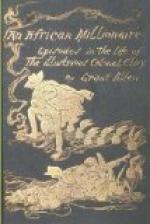We dropped in at the Cromarty Arms, and asked good Mrs. M’Lachlan if she could tell us anything about the gentlemanly stranger. Mrs. M’Lachlan replied that he was from London, she believed, a pleasant gentleman enough; and he had his wife with him.
“Ha! Young? Pretty?” Charles inquired, with a speaking glance at me.
“Weel, Sir Charles, she’ll no be exactly what you’d be ca’ing a bonny lass,” Mrs. M’Lachlan replied; “but she’s a guid body for a’ that, an’ a fine braw woman.”
“Just what I should expect,” Charles murmured, “He varies the programme. The fellow has tried White Heather as the parson’s wife, and as Madame Picardet, and as squinting little Mrs. Granton, and as Medhurst’s accomplice; and now, he has almost exhausted the possibilities of a disguise for a really young and pretty woman; so he’s playing her off at last as the riper product—a handsome matron. Clever, extremely clever; but—we begin to see through him.” And he chuckled to himself quietly.
Next day, on the hillside, we came upon our stranger again, occupied as before in peering into the rocks, and sounding them with a hammer. Charles nudged me and whispered, “I have it this time. He’s posing as a geologist.”
I took a good look at the man. By now, of course, we had some experience of Colonel Clay in his various disguises; and I could observe that while the nose, the hair, and the beard were varied, the eyes and the build remained the same as ever. He was a trifle stouter, of course, being got up as a man of between forty and fifty; and his forehead was lined in a way which a less consummate artist than Colonel Clay could easily have imitated. But I felt we had at least some grounds for our identification; it would not do to dismiss the suggestion of Clayhood at once as a flight of fancy.
His wife was sitting near, upon a bare boss of rock, reading a volume of poems. Capital variant, that, a volume of poems! Exactly suited the selected type of a cultivated family. White Heather and Mrs. Granton never used to read poems. But that was characteristic of all Colonel Clay’s impersonations, and Mrs. Clay’s too—for I suppose I must call her so. They were not mere outer disguises; they were finished pieces of dramatic study. Those two people were an actor and actress, as well as a pair of rogues; and in both their rôles they were simply inimitable.
As a rule, Charles is by no means polite to casual trespassers on the Seldon estate; they get short shrift and a summary ejection. But on this occasion he had a reason for being courteous, and he approached the lady with a bow of recognition. “Lovely day,” he said, “isn’t it? Such belts on the sea, and the heather smells sweet. You are stopping at the inn, I fancy?”
“Yes,” the lady answered, looking up at him with a charming smile. ("I know that smile,” Charles whispered to me. “I have succumbed to it too often.”) “We’re stopping at the inn, and my husband is doing a little geology on the hill here. I hope Sir Charles Vandrift won’t come and catch us. He’s so down upon trespassers. They tell us at the inn he’s a regular Tartar.”




